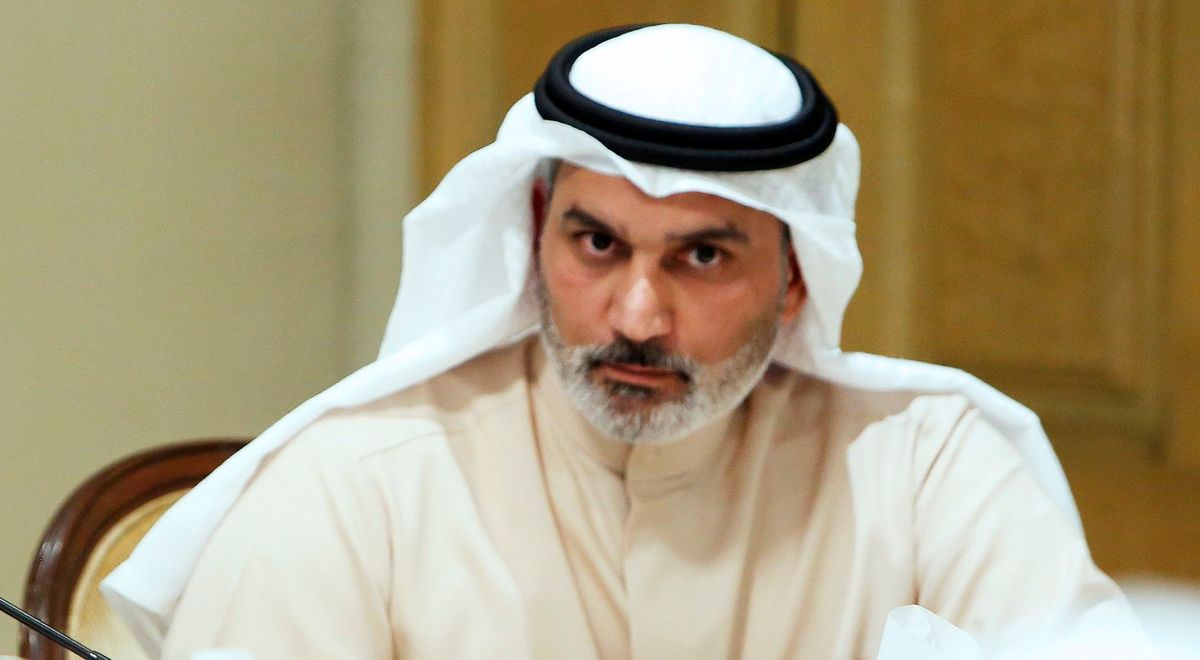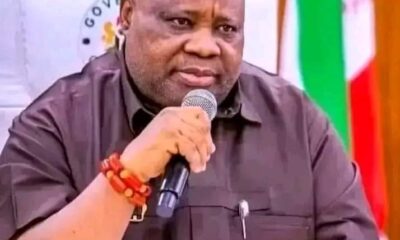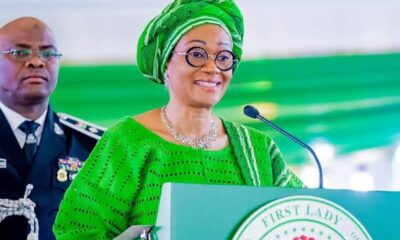Opinion
Osun phoney N100bn infrastructure: Adekele’s misplacement of priorities and politics of deception
By Waheed Adekunle
While the development of infrastructure is universally viewed as important to advancing the collective cause of socio-economic development, and seen as productivity stimulant and enhancer of the quality of life, it is apposite not to be misplaced for the purpose of deception.
It is no more news that the Osun state government, led by Senator Ademola Adeleke has been running the affairs of the state like a personal enterprise since assumption of office in the last eleven months, judging from the empirical evidence that is abound.
This palpable anomaly revolves around the system and had eaten deep into the fabrics of governance and it has become too obvious to be ignored by discerning citizens and concerned residents.
A dispassionate assessment and critical analysis of the-good, the-bad and the ugly of the administration had left no one in doubt of the glaring porosity and lack of direction, administrative acumen, governance prowess and of course, lack of political-will to drive a well-structured economy of a state like Osun let alone, administering the affairs of a highly sophisticated segment of the residents of the state.
The heights of incompetence displayed by the government hinged on the recent disclosure made by the governor to embark on white-elephant projects parochially conceived to address self-acclaimed infrastructure deficit in the state.
The proposed projects, estimated to the tune of a N100billion, is not only a fantasy but a quagmire, widely considered as a gross misplacement of priority, particularly, at a time, the citizens in general and workers in particular are facing serious hardship due to the present socio-economic realities occasioned by the fuel subsidy removal.
Governor Adeleke, had in a statement, announced his plans to construct five flyovers; two in Osogbo, one in each of Ede, Ikirun and Ile-Ife, to ease traffic across the state. He also identified 45 roads to be constructed as part of what the ¦ 100billion non-existent funds would be expended on.
Other projects listed include, the rehabilitation of 345 health centres and phase 2 of potable water provision both in the 332 Wards, and phase 2 of school rehabilitation in 31 schools of the 30 Local Government Areas as well as the dualisation of roads in Osogbo, Ede, and Ilesa.
According to Adeleke, the projects would be financed solely by the government without borrowing from financial institution, a delusionary statement that can only come from a confused administration in a depressed economy, in the case of Osun.
Examining the Governor Adeleke led-government’s proposed projects, one needs not to ponder to know that the enlisted projects are products of imaginary disposition to hoodwink the public, deplete the state’s meagre resources and of course enriching the pockets of government allies, political loyalists and associates.
Since the delusory statement was made, no iota of justification has been made by any of the government officials as to the source of funding the proposed projects. This is indeed far from sensitivity; principles of good governance and of course, lacking in logic and reasoning.
From the critical analysis of the proposed ‘N100billion infra plan’ one-by-one, it is apparent that the proposed Owode-Ede flyover is not only ill-advised or ill-thought, but a frivolous concept to skew government attention and patronage in favour of the governor’s kinsmen.
It is pathetic that in spite the palpable economic reality, Osun government can come up with frivolities, and resolve to expending the public funds on projects that can neither add value nor importance to the state at the moment.
Without being prejudicial, what socioeconomic value is Owode-Ede flyover to bring to the state while Osun is in dire need of economic rejuvenation and sectorial investments capable of facilitating development and expand multiplier effect on the welfare and general wellbeing of the people? No doubt, the motive has further exposed the government’s clannish tendencies and nepotic motives that had been the foundation of the administration since its inception.
Going by the claims of the government that the five proposed flyovers were painstakingly selected across the three Senatorial Districts, it is safe to say that the portion of Osun West is what allocated to Owode-Ede, a microscopic settlement and an outskirts of Osogbo, the state capital.
Osun West Senatorial District with ten Local Government Areas and several LCDAs, warehousing notable towns and cities, such as Iwo, Ikire, Ejigbo, Apomu, Gbongan, Ode-Omu, Ikoyi, Orile-Owu, Oluponna, Ile-Ogbo, Awo, Ido-Osun, among others have consistently been at the mercy of government for attention when it comes to the spread of developments simply because the governor’s hometown (Ede) domiciles in the District.
The implications of the continuous lion share of Ede in the scheme of things in the state in general and in the District in particular remain that even with the proposed project, other towns would be unconscientiously made to sacrifice the flyovers to Owode-Ede based on myopic resolve of the ruling class.
If not for needless aesthetics and parochial satisfaction, constructing a flyover at Owode-Ede is as good as nothing, and claiming that it is considered to prevent incessant road mishaps on the axis due to the artificial market square, is not only a political mirage but a flagrant misplacement of priority.
Similarly, the proposed Alamisi junction flyover in Ikirun is not only a collosal waste but a gross ill-hearted political emancipation to reward an insignificant segment of loyalists, otherwise, one wouldn’t have come to terms to conceptualise such motive, at a time like this, that the state is struggling to pay salaries and pensions with humongous debts of salaries and pensions arrears.
While the proposed Ile-Ife flyover seems to be a welcome development, the question agitating minds was its socioeconomic importance at this moment if not for political reasons to manipulate public psyches and score cheap political scorecards.
In the same vein, the proposed rehabilitation of 345 health centres across 332 political Wards can be best described as an ‘Executive Charade’ to further plunder the public resources. The bizzare in the move is all about the interest of the government to embark on the rehabilitation of the PHCs. Are they not the same health centres revitalised by his predecessor— Adegboyega Oyetola?
No doubt, the clear motive behind this political expedition is to spend the state resources on another phoney project like that of the ‘audio borehole.’
The heights of the ridicule that the proposed ‘infra plan’ further subjected the state to was the pronouncement of phase two of potable water (borehole project) in the 332 Wards and phase 2 of school rehabilitation in 31 schools of the 30 Local Government Areas as well as dualisation of roads in Osogbo, Ede, and Ilesa.
The question to ask is, what’s the economic benefit of the first phase borehole project claimed to have been done across the state? Is that not another misplacement of priority for a government that had showcased failure on its part to fix and revamp the State Water Corporation?
Has the state government ever made public relevant documents to intimate residents with the statistics of the rehabilitated schools as claimed? Where are the phoney schools rehabilitated? What necessitates the second phase if there is first phase at all? Until accurate answers are provided to these hanging questions, the entire process remains a fallacy.
It is quite unfortunate that the Adeleke’s administration that claimed to be prudent, transparent and accountable had continuously displayed otherwise and acting in contrary, as its pseudo claims across sectors of the economy had fallen flat to their faces.
The government had consistently failed to prove sanity in its actions and inactions since the inception as it failed to account for what was expended on some of the executed projects most significantly the phoney borehole projects claimed to have been done across the 332 political wards in the state.
The ‘audio borehole project’ that Adeleke’s administration failed to disclose its cost before embarking on it was later revealed to have been executed at the rate of ¦ 1.5million after self-acclaimed completion, leaving the citizens in the dark of where the money was sourced and the total cost of the project. Even at that, the amount claimed by the governor as the cost of the project was different from the figure released by his spokesman.
Citizens cannot forget in a jiffy the mystery behind the borehole project which the total cost was concealed from public before the governor recently disclosed it at the public enlightenment programme.
The law of sensitivity and sensibility demand the government to have learnt a lesson from its failed promises, lack of transparency and probity.
Surprisingly, the governor, on Wednesday publicly disclosed the readiness of his administration to embark on another phoney project with a whooping sum of N100billion, boasting that the state would execute the project without resorting to borrowing.
Some of the questions agitating the minds of the people are the fact that why the government is embarking on such white-elephant projects in view of the current socioeconomic realities in the state?
It is on record that since the Adeleke’s administration received N2billion from the federal government as palliative fund to cushion the adverse effects of fuel subsidy removal, the state had done nothing in that regards, instead, it has resorted to failed promises.
The question now is, why the government deliberately chose to compound the hardship on the people by hoarding the funds meant for same purpose? It’s like the government is deriving pleasure afflicting pains on the people, if not, the palliative funds would have been judiciously used for the purpose it was meant for.
Aside this, the state government has been hoarding another N7billion Special Funds received from federal government to address the adverse effect of fuel subsidy removal.
The state workforce has been at the mercy of government to survive, yet the state is hoarding N9billion. The residents are facing serious hardship on daily basis to survive, yet the state couldn’t find any solution. While other states have come up with workable measures to address the situation, Osun is lagging behind and revolving in stagnation. Instead of doing the needful, the state is mustering efforts to embark on frivolous white elephant projects.
It’s better to do right, even if we suffer in so doing, than to incur the reproach of our consciences and posterity. Posterity will pay everyone his or her due.
May God heal our land!
Opinion
Tinubu, the opposition and the Nigerian honey pot


By Professor Kayode Soremekun
As the Tinubu administration approaches the one year mark, it is important to effect a review of what has transpired in the last twelve months.
At the level of sheer policy postures and pronouncements, much has been done and so much is also being done, such that it is almost impossible to keep pace .
In this narrative however, I have decided to dwell on an unusual aspect of the last twelve months.
On this note, the thrust of my argument is this:Nigeria is a lucrative honeypot for external actors and their local collaborators. It is a situation in which every achievement of this administration translates into a loss for external actors and their interests. These indeed are the various indices of the opposition which will continue to stalk this administration.
At the instinctual level, and unfortunately, the average reader is likely to view the opposition in terms of predictable variables like the: PDP, LP and possibly the various indices of civil society.
But this piece is not preoccupied with these.
Rather our attention is focused on the implications of the evolving dynamics of Air Peace (AP)and the competition in the aviation industry.
It is instructive to recall here that, as soon as AP ticked off on the Lagos-London route, the other airlines came into some form of self-serving epiphany. They changed tack through the process of fare reductions.
The implications of this on-going process are deeper than one may think. As long as Nigeria was absent on the Lagos-London route, the route was something of a honey pot for the other airlines. It was a sybaritic situation in which all the other airlines were busy enjoying themselves at the expense of Nigerians and Nigeria.
In my innocence I thought that the only airline that was benefitting from this bazaar of the Lagos- London route was British Airways (BA) whose ancestors were the original predators of what passes for the Nigerian state. Little did I know that other Airlines like Air Maroc and Egyptair were also partakers of this largesse.
On this note, the mind remembers the goggled General, Sani Abacha. In the light of the inclement interplay between his regime and Britain, British Airways was banned from Nigeria. But as soon as he died, BA resumed its lucrative foray into Nigeria. One can imagine how much BA must have lost in the light of that move by the General.
The implication is that for every omission or commission on the part of Nigeria, someone out there is smiling home with huge profits. Such forces and individuals constitute at one level the opposition that anyone who occupies Aso Rock, has to contend with. Needless to say, our Nigeria is a huge honeypot since we are talking here of a huge market of 200 million Nigerians.
The situation also partly explains why the Naira will continue to go south since for most of our basic needs, we depend heavily on the external realm. It also explains why anybody who occupies Aso Rock is not just up against the usual opposition at the domestic level, he is also up against the various indices of opposition beyond Nigeria.
And here we are talking about hard-headed interests and zero-sum games in which what one entity loses, is gained by another one.
This brings to mind another major area in which over time, Nigeria continues to be a spectator in the scheme of things.
Our specific reference here is the Nigerian oil industry. Nigeria continues to be passive in this industry. So passive that as an oil producing country there are no backward linkages like refineries and petrochemicals. Even as I write, there are rumblings to the effect that there are jitters out there. This is because, should Nigeria succeed in bringing on stream her own refineries, very many jobs will be lost by refiners in places like Rotterdam and South Korea. These are some of the entities who export refined oil to an oil producing Nigeria. Again as regards petrochemicals, should Nigeria come into her own in this vital area, then our imports of raw materials will reduce drastically. In the light of what is happening to Air Peace, we should expect a fight-back from relevant interests out there.
Very much the same thing can be said for our steel industry.Till date, it remains comatose. No thanks to international conspiracy ably aided by a wayward ruling class.This is invariably a sad feature which stretches far back to the dawn of our political independence. Again, Nigeria’s attempts to come into her own in this vital area will be resisted, and vigorously too, by the relevant external forces out there in collaboration with their internal allies. So as PBAT Tinubu settles into his second year in office, he will do well to remember and appreciate that he will be contending with various indices of the opposition at the external various ways these have their tongues and fingers in the Nigerian honey-pot.They will not give up easily.Which is why, the Tinubu presidency should give these self-serving domestic and external forces a good run for their greed and avarice.
There is some hope however. This cautious optimism lies in the fact that, in the course of that historic outing in Abeokuta where Tinubu openly staked his claim to the Presidency he also pronounced with equal gravity on his place in history. Specifically he opined that he would not want to be a footnote to the Nigerian narrative. So all said and done, it is possible to contend here that in the light of what can be regarded as his self-conscious place in history; PBAT has his work cut out for him in critical and vital areas of our national life like: the steel industry, our oil industry and of course the Aviation sector.
Success in these various areas can only mean that the Great Black Hope is ready to come into her own.
Soremekun, a professor of political science was the second vice chancellor of Federal University Oye Ekiti, Ekiti State.
Opinion
Organisation of the Petroleum Exporting Countries’ (OPEC) pride in its African roots


By Haitham Al-Ghais, OPEC Secretary General
Since assuming the office of OPEC Secretary General almost two years ago, I have had the privilege of visiting every African OPEC Member Country, as well as several other African countries. Every visit has reaffirmed my firm conviction that the future is bright for Africa and that the oil industry can play a constructive role in that future. Our Organisation stands ready to offer any support it can to help this great continent realise its awesome potential.
OPEC takes great pride in its strong and enduring African connections, heritage and identity. Half of our Member Countries are African and this includes the continent’s most populous country, Nigeria, and the geographically largest by area, Algeria. We are also privileged to count Congo, Equatorial Guinea, Gabon and Libya as Member Countries. Additionally, two African countries are part of the historic ‘Declaration of Cooperation,’ between OPEC and non-OPEC producing countries, namely Sudan and South Sudan.
Our Organisation’s past is imbued with African character. Looking throughout our 63-year history, many significant meetings took place in African cities. From the Ninth Meeting of the OPEC Conference in Tripoli in 1965, critical meetings and conferences have been held in Algiers (including our first ever Summit), Oran, Lagos, Abuja, Luanda, and Libreville.
Indeed, the idea for our Organisation was conceived in Africa, specifically Egypt. It was at the Cairo Yacht Club in 1959, that the Gentleman’s Agreement was forged that paved the way for the establishment of OPEC in Baghdad in September 1960.
Having played a pivotal role in shaping our past, we have no doubt Africa will be instrumental in the Organization’s future and the future of the oil industry. This is a dominant theme in OPEC’s World Oil Outlook 2045 (WOO).
Africa has a young and vibrant population. By 2045, the Middle East and Africa are forecast to be the leading regions by overall population, adding 723 million people in the period 2022-2045.
We anticipate a bright future for Africa’s oil industry with substantial opportunities for growth. The continent is home to five of the top 30 oil-producing countries and its proven oil reserves amounted to around 120 billion barrels at the end of 2022. This will be crucial to meet the growing global demand for oil, which is expected to rise to 116 million barrels per day (mb/d) by 2045.
These resources will be crucial in enabling African countries to deliver for their peoples. For many oil-producing developing nations, oil production is a way to generate revenue streams that help address pressing and legitimate needs, such as development, employment, education, reducing poverty and investing in public services.
One of the great challenges facing governments here and, indeed, in many other parts of the world is energy poverty. There are 675 million people worldwide who lack access to electricity, four out of five of whom live in sub-Saharan Africa. Furthermore, 2.3 billion people are without clean fuels and technologies for cooking, which can lead to a host of related health and environmental problems.
Of course, OPEC supports efforts that lead to a reduction in greenhouse gas emissions, but we look for this to be achieved in a manner that strikes a fine balance between energy security and sustainable development; ensuring that nobody is left behind. We are also strong advocates for the principle of common but differentiated responsibilities and respective capabilities.
The continent of Africa is home to 17 percent of the world’s population, but is responsible for under 4 percent of global CO2 emissions, with many African countries contributing virtually nothing to global emissions.
When we consider historic cumulative CO2 emissions, the G7 has contributed over 43% of the total alone since 1850, while OPEC Member Countries account for only 4 percent.
These statistics reflect the fact that there is no ‘one size fits all’ solution to addressing climate change and national circumstances need to be taken into account. We need an all-peoples, all technologies and all-energies approach. Technological innovation is a key focus for our Organisation.
It is why our Member Countries are investing heavily in hydrogen projects, Carbon Capture and Utilisation and Direct Air Capture facilities, and the circular carbon economy.
Looking at recent developments across the energy scene in Africa, we see opportunities for the oil industry in places like Namibia, Senegal, Mozambique and Mauritania, to name but a few. OPEC is attentive to these developments and stands ready to support all countries on the African continent in the next chapter in developing their industries. In this regard, we look forward to enhanced cooperation with the African Energy Chamber in the years and decades to come.
The African Energy Chamber, as the voice of the African energy sector, commends OPEC’s commitment to the growth of the African oil and gas industry.
Opinion
President Tinubu: A year of healing and unifying Nigeria


By Fredrick Nwabufo
The intangibles of leadership are as potent and profound as the corporeal manifestations of governance. A people must not only see the brick-and-mortar elements of leadership; they must also feel and sense leadership in its quantum of compassion, healing, solace, and capacity to inspire unity, as well as foster peace and progress.
In fact, the incorporeal constituents of leadership are so important that citizens may not see utility in improved economic well-being and massive industrial transformation, if the leadership does not manage the delicate confluences of social and psychological needs.
In some of my treatises as a columnist years ago, I had written that beyond other rudimentary ingredients and supplements of leadership, Nigeria needs a leader who is a healer-in-chief and a unifier by example. A leader who has the proclivity and deliberateness to bring the nation together.
I am most delighted and proud to say Nigeria has found its healer-in-chief; its unifier by example, and consoler-in-chief in President Bola Tinubu. He is the President for all Nigerians.
It has been President Tinubu’s one year of healing and unifying Nigeria. In his inaugural speech on May 29, 2023, the President made a declaration that has become a defining motif of his administration.
He said: “Our administration shall govern on your behalf but never rule over you. We shall consult and dialogue but never dictate. We shall reach out to all but never put down a single person for holding views contrary to our own. We are here to further mend and heal this nation, not tear, and injure it.”
And true to his promise, President Tinubu has been listening and reaching out to Nigerians of diverse complexions and artificial partitions, as well as mending and healing the nation.
Healing and unifying the nation, how, you might ask? By personal example; in words and in deeds. There is no greater purpose and value to leadership than personal example. The place of leadership in forging bonds of communality is the place of purpose and deliberateness. Leadership must be deliberate in managing diversity and in fostering kinship among variegated people. Nation building cannot be left to chance or to a whim. There must be purposive plans and actions towards uniting the people. And these plans and actions, President Tinubu has been successful at carrying through in the past one year.
The President has maintained an accustomed patriotic, graceful, and expansive mien. In his public statements, mostly done extempore, he has always faithfully affirmed his commitment to Nigeria’s unity.
In one of his many noble articulations, he said, “I am irrevocably committed to the unity of Nigeria and constitutional democracy. Constitutional democracy has been reflected greatly here since we assumed office.”
Also to consider are the broad and far-reaching projects and programmes which are in themselves totems of unity – with all Nigerians, irrespective of class or creed, as beneficiaries and potential beneficiaries.
The approval of the Renewed Hope Infrastructure Development Fund to facilitate effective infrastructure development across the pivotal areas of agriculture, transportation, ports, aviation, energy, healthcare, and education, with salient projects across the country is a further affirmation of statesmanship and leadership.
The ongoing epochal Lagos-Calabar Coastal Road, with its attendant immense economic and social benefits to many states within and outside that corridor; the Sokoto-Badagry Road project, and the completed Port Harcourt to Aba stretch of the Port Harcourt to Maiduguri narrow-gauge rail, among other key developments across the nation, assert the all-encompassing and genuine intentionality to nation building. No Nigerian is left behind.
Within the first year, the President also approved the upgrade of key health infrastructure and equipment across all six geo-political zones in line with his administration’s vision of overhauling the health and social welfare sector for enhanced service delivery to all Nigerians.
The following teaching hospitals across the geo-political zones were marked for the establishment of oncology and nuclear medicine centres as part of the President’s bid to ensure that top-tier cancer diagnosis and care is accessible across the country: (1) University of Benin Teaching Hospital, (2) Ahmadu Bello University Teaching Hospital, (3) University of Nigeria (Nsukka) Teaching Hospital, (4) Federal Teaching Hospital, Katsina, (5) University of Jos Teaching Hospital, and (6) Lagos University Teaching Hospital.
Ten other hospitals across all the geo-political zones were also pencilled for critical healthcare-service expansion projects across the fields of radiology, clinical pathology, medical and radiation oncology, and cardiac catheterisation.
The take-off of the first phase of the Consumer Credit Scheme, which is essentially a mitochondrion enabling citizens to improve their quality of life by accessing goods and services upfront, paying responsibly over time, and by the same token bolstering local industry and stimulating job creation is another social cohesion sealant – with all classes of working Nigerians as beneficiaries. In summary, the establishment of the Nigerian Education Loan Fund (NELFUND) with the pre-eminent vision of safeguarding Nigeria’s future by ensuring that all Nigerian students and youths, regardless of their social, ethnic, or religious backgrounds, have access to sustainable higher education and functional skills, further accents the President’s fidelity to building a stable, strong, united, peaceful, and progressive nation.
One thing is certain: Citizens agree that they have a President for all Nigerians.
-
Finance4 months ago
Court orders Sen. Victor Umeh to repay N136m bank debt to AMCON
-



 Abuja Update3 months ago
Abuja Update3 months agoUNDP, FG partnership needed to achieve inclusion, equity- Minister
-
Abuja Update2 months ago
Banks drive stock market performance with N147bn gain
-
capital market2 years ago
Rt.briscoe, FBNH, Others halts negative performance of stock market
-
Submission Guidelines4 months ago
CALL FOR SUBMISSIONS: POETRY COLUMN-NND
-



 Health1 month ago
Health1 month agoCapacity training will reduce migration of health workers- NPHCDA
-



 Business4 weeks ago
Business4 weeks agoTingo Group unveils Tingo Electric, Tingo Cola drink at Lagos launch
-
News4 months ago
Oil thieves sponsoring malicious media campaign against Navy – Spokesman














